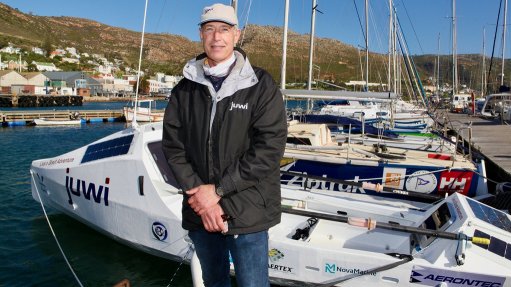
juwi economic development manager Zirk Botha with his boat - Ratel - at the False Bay Yacht Club.
Departing in December, Capetonian Zirk Botha – a former naval combat officer and adventure racer – will undertake a 7 000 km solo rowing trip from Cape Town to Rio de Janeiro, in Brazil, with renewable energy company juwi Renewable Energies South Africa sponsoring his feat.
Botha, who also works for juwi, is undertaking to row in support of the environment and climate change.
The Atlantic crossing will require Botha to row completely unassisted for about 90 days, over an often treacherous and unpredictable ocean.
He served as a naval combat officer in the South African Navy, where he also qualified as a combat diver. During his time in the navy, he completed three Atlantic crossings. He is also a qualified 200T yacht captain and has sailed extensively.
juwi says its vision of 100% renewable energy is in support of building a healthy sustainable environment and is therefore well aligned to Botha’s physical challenge, which will rely completely on his own strength, with critical support of power through solar panels and batteries to power his equipment for the crossing.
juwi South Africa MD Greg Austin says Botha’s crossing epitomises the way juwi is taking the lead in innovation and breaking barriers for the environment. “We wish [Botha] all the best for the row – his pioneering spirit, courage, grit and commitment to the environment are qualities that juwi respects and fully aligns with.”
Botha says he wants to use the challenge to spotlight the impact of fossil fuels and irresponsible consumerism on the planet which will be the future home of today’s children and future generations. “Renewable energies are essential to a sustainable future.”
“For my solo row from Cape Town to Rio de Janeiro I will be 100% self-sustaining for over three months. This provides a perfect showcase to support a message that 100% renewable energy is a practical option.
"In fact, in this case, it is the only viable option – I will be totally reliant on solar-charged batteries as the source of electricity for my desalinator, autopilot, safety equipment, radio and satellite communications equipment,” he says.
Botha adds that his professional position as economic development manager at juwi, equips him to speak with knowledge regarding the competitive costs, job creation and practical benefits of renewable energy.
“The platform that the ocean crossing creates will allow me to drive home the message that the increased uptake of renewable energy is a key solution to the climate change challenges faced by our planet.”
ABOUT THE ATLANTIC CROSSING
According to Botha, ocean rowing is considered to be the ultimate challenge of human endurance, with more people having climbed Mount Everest than have crossed an ocean in a rowing boat. “I will have no supporting safety boat, and I can expect to experience large waves and swells travelling across the southern Atlantic,” he says.
“I will row for 14 hours a day on average, expecting to take [more than] 100 days to complete the crossing to Rio. The energy requirements are significant and staying well-hydrated is very important. I will probably consume 10 ℓ of water and 8 000 calories of food a day. A normal person consumes about 2 500 calories a day. Even so, I expect to lose over 12 kg crossing the Atlantic.”
In preparation to make the crossing, Botha has built his boat, almost single-handedly, and has just completed installing equipment including solar panels, navigational and satellite equipment, and a desalinator to remove salt from seawater. The construction of the ocean rowing boat is based on a design by naval architect Phil Morrison.
The boat has been named Ratel, which is Afrikaans for honey badger, an animal known for its courage and tenacity.
Botha is currently doing the requisite safety tests on open water to obtain a Certificate of Fitness for the boat, and is in training with his rowing coach Derrick Read from the Cape Coastal Rowing Club.